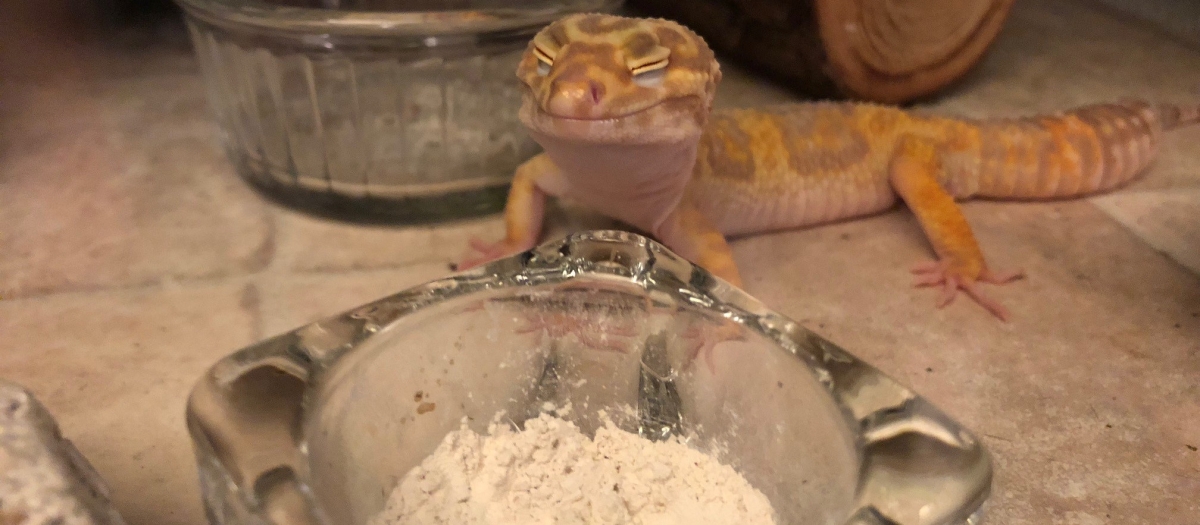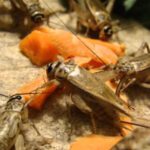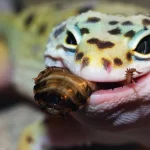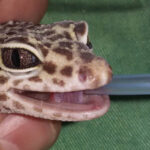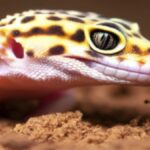Leopard geckos need nutritional supplements to maintain health and longevity. In captivity, their diet often lacks the variety of nutrients found in the wild, leading to deficiencies if left unaddressed. Supplementation helps bridge this gap, ensuring geckos get essential nutrients like amino acids, vitamins, and minerals.
In the wild, Leopard geckos naturally consume a varied diet that provides these nutrients. Captive geckos, however, rely heavily on their caregivers to meet these needs through effective supplementation.
Table of Contents
Methods of Supplementing Leopard Gecko Diets
There are three primary methods to add supplements to a Leopard gecko’s diet: dusting, gut-loading, and direct supply. Each method plays a role in providing essential nutrients.
1. Dusting Live Prey
- What is Dusting? Dusting involves coating feeder insects with powdered supplements, which geckos then consume.
- Common Supplements: Calcium and Vitamin D3 powders are the most frequently used.
- Frequency: For young and gravid (pregnant) geckos, dusting should be done 2-3 times per week.
Table: Dusting Schedule for Leopard Geckos
| Gecko Age/Condition | Dusting Frequency | Supplements Needed |
|---|---|---|
| Juvenile | 3 times a week | Calcium with Vitamin D3 |
| Adult Male | 2 times a week | Calcium with Vitamin D3 |
| Gravid Female | 3 times a week | Calcium with Vitamin D3 |
Dusting ensures that essential nutrients reach the gecko through their diet, supporting bone health and general wellness.
2. Gut-Loading Insects
- What is Gut-Loading? This method involves feeding nutrient-rich foods to feeder insects before offering them to the gecko.
- Common Insects for Gut-Loading: Crickets, mealworms, and cockroaches.
- Timing: Insects should be gut-loaded 24-48 hours before feeding them to Leopard geckos.
When feeder insects are gut-loaded, they provide additional nutrition for geckos. This method works best when done in combination with dusting, enhancing the overall nutrient intake.
Table: Recommended Gut-Loading Diet for Feeder Insects
| Insect Type | Gut-Loading Time | Foods for Gut-Loading |
|---|---|---|
| Crickets | 24-48 hours | Vegetables, leafy greens, grains |
| Mealworms | 24-48 hours | Carrots, squash, vitamin powders |
| Cockroaches | 24-48 hours | High-calcium vegetables, grains |
By gut-loading feeder insects, you can enrich the diet of your gecko with essential vitamins and minerals, simulating the natural nutritional balance they would find in the wild.
3. Direct Calcium Supply
- How it Works: A small dish of calcium powder, usually combined with Vitamin D3, is left in the enclosure.
- Purpose: Geckos can lick the powder as needed, supplementing their calcium intake independently.
- Ideal for: Growing geckos and females during the breeding season.
This “ad lib” calcium supplementation is beneficial, especially for young and gravid geckos, ensuring they receive adequate calcium without the risk of over-supplementing.
Natural Nutritional Sources for Leopard Geckos
In their native habitats, Leopard geckos consume various prey, including invertebrates and small vertebrates. These natural food sources are inherently balanced, providing essential nutrients that keep geckos healthy.
Fact: Wild-caught insects tend to have more naturally occurring vitamins and minerals due to their varied diet and exposure to the environment. This natural balance is challenging to replicate in captivity, making supplements crucial for captive Leopard geckos.
Essential Supplements for Leopard Geckos
The primary supplement required by Leopard geckos is calcium, vital for bone health and egg production in gravid females. Calcium supplements typically come in powdered form and are combined with Vitamin D3 to aid in calcium absorption.
Table: Essential Supplements for Leopard Geckos
| Supplement | Purpose | Recommended Frequency |
|---|---|---|
| Calcium + D3 | Bone health, egg development | 2-3 times per week |
| Multivitamins | Overall health, immunity | Once a week |
| Gut-Loading | Enhances insect nutritional value | 24-48 hours before feeding |
For juvenile geckos and gravid females, it’s recommended to dust food with calcium powder three times a week, whereas adult males may only need supplementation twice a week. Multivitamins, while beneficial, should complement calcium supplements rather than replace them.
Choosing the Right Supplements
Selecting high-quality supplements is essential for your Leopard gecko’s health. Look for calcium powders with Vitamin D3 to support bone development and prevent metabolic bone disease. Multivitamins should include:
- Vitamin A: Supports vision and immune function.
- Vitamin E: Acts as an antioxidant.
- Trace Minerals: Essential for overall health.
Note: Multivitamin supplements should not replace calcium powder, as they lack the necessary calcium concentration.
By understanding each supplement’s role and following an appropriate schedule, you can create a balanced, nutritionally complete diet for your Leopard gecko. These methods help replicate the nutrient diversity found in the wild, supporting your pet’s long-term health.
Summary and Recommendations
A well-rounded supplementation plan is essential for keeping Leopard geckos healthy in captivity. By combining dusting, gut-loading, and direct calcium supply, you can provide a diet that closely resembles what they would encounter in the wild.
Regular supplementation of calcium and vitamins supports their physical development and prevents common health issues like metabolic bone disease. Following these guidelines ensures a healthier and more active pet, enhancing both their quality of life and your experience as a gecko owner.

